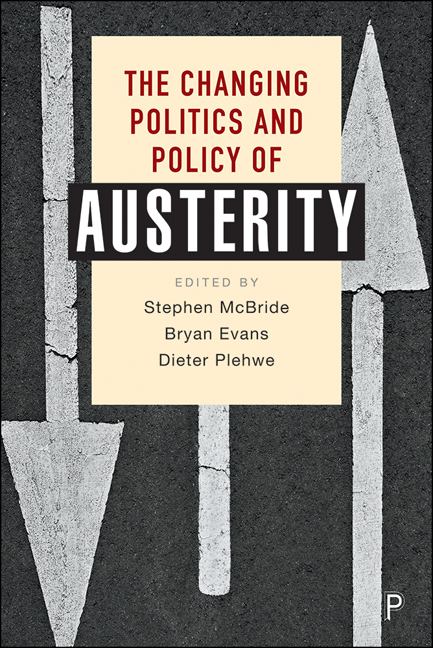Book contents
- Frontmatter
- Contents
- List of figures and tables
- Notes on contributors
- Acknowledgements
- Introduction
- PART I Austerity and the promotion of the private
- PART II Coping and casualties: labour and the social
- PART III Beyond coping: protest, pathologies and the development of real alternatives
- Conclusion
- Index
2 - Institutionalizing austerity accounting in Europe: the implementation of European Public Sector Accounting Standards as crisis response
Published online by Cambridge University Press: 13 May 2022
- Frontmatter
- Contents
- List of figures and tables
- Notes on contributors
- Acknowledgements
- Introduction
- PART I Austerity and the promotion of the private
- PART II Coping and casualties: labour and the social
- PART III Beyond coping: protest, pathologies and the development of real alternatives
- Conclusion
- Index
Summary
Accounting for public finances is always political, even more so in times of crises. Material resources are core to allow for short-term crisis relief but, more fundamentally, they are necessary for the provision of public services more broadly. In this regard, health crises are not much different from earlier financial crises, as states need substantial amounts of money, both short and long term for effective crisis response. In 2020, as well as ten years earlier after the financial crisis, public expenditures sky-rocketed and public debt increased substantially. While it is still way too early to make predictions on how COVID-19 will develop and how public finances will be affected, a look back at the global financial crisis of 2007/2008 provides some insights on how austerity policies were introduced in Europe. This chapter does not focus on any particular policy field. Instead, I analyze the implementation of a new set of accounting rules that enable austerity politics as part of comparing and streamlining public accounts.
I argue that the implementation of such standards can be interpreted as the institutionalization of an austerity infrastructure. I suggest that an austerity infrastructure is the institutional and the socio-legal context in which a specific accounting constellation flourishes. Critical scholars interpret an accounting constellation as a relational field of institutions, economic and administrative processes, bodies of knowledge, systems of norms, practices of measurement and classification techniques in accounting (Burchell et al 1985; Botzem 2012, 22). In that sense, an austerity infrastructure is the expression of and a tool for an accounting constellation that is dominated by neoliberal thought in general and investment logics in particular.
In this chapter, I will provide an analysis of how the European Union reacted to the global financial crisis of 2007/2008 by tightening the budgetary requirements for its member states. At the core is an institutionalist analysis of how market-oriented public sector accounting standards become the law of the land. Behind the apparently dry issue of implementing novel European budgetary standards lies a political battle in which neoliberals have achieved a great victory by implementing an unlevel playing field through the introduction of an austerity-prone budgetary and calculatory infrastructure. Europe's new standards for national accounts privilege capital providers as they primarily require the provision of financial information that is relevant for investors.
- Type
- Chapter
- Information
- The Changing Politics and Policy of Austerity , pp. 42 - 60Publisher: Bristol University PressPrint publication year: 2021



